University Name - Integrated Business Research: CSR Literature Review
VerifiedAdded on 2022/12/29
|11
|3036
|88
Report
AI Summary
This literature review examines the integration of Corporate Social Responsibility (CSR) into business practices, covering key areas such as board diversity and its impact on CSR, the relationship between firm internationalization and CSR, the influence of CSR on consumer satisfaction, and the implications of business groups on CSR. The review analyzes studies related to stakeholder theory, the impact of gender equality on CSR, and the effect of CSR practices on firm performance. It also explores the role of management in mediating between diversity and CSR, the impact of internationalization on CSR standards, the relationship between CSR and consumer loyalty, and limitations in current research. The analysis concludes that CSR is crucial for corporations and should be implemented with consideration of cultural, economic, and social aspects.
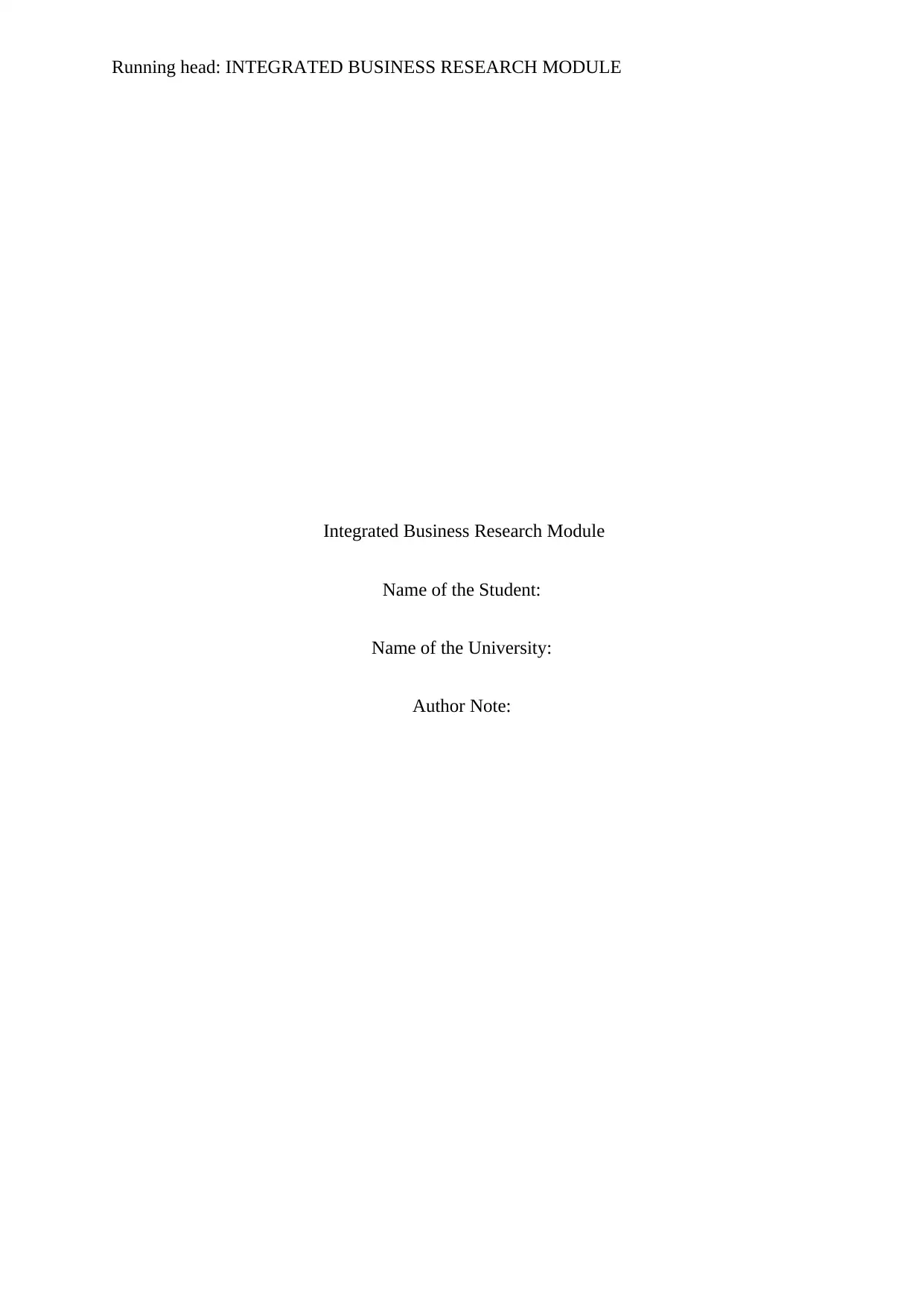
Running head: INTEGRATED BUSINESS RESEARCH MODULE
Integrated Business Research Module
Name of the Student:
Name of the University:
Author Note:
Integrated Business Research Module
Name of the Student:
Name of the University:
Author Note:
Paraphrase This Document
Need a fresh take? Get an instant paraphrase of this document with our AI Paraphraser
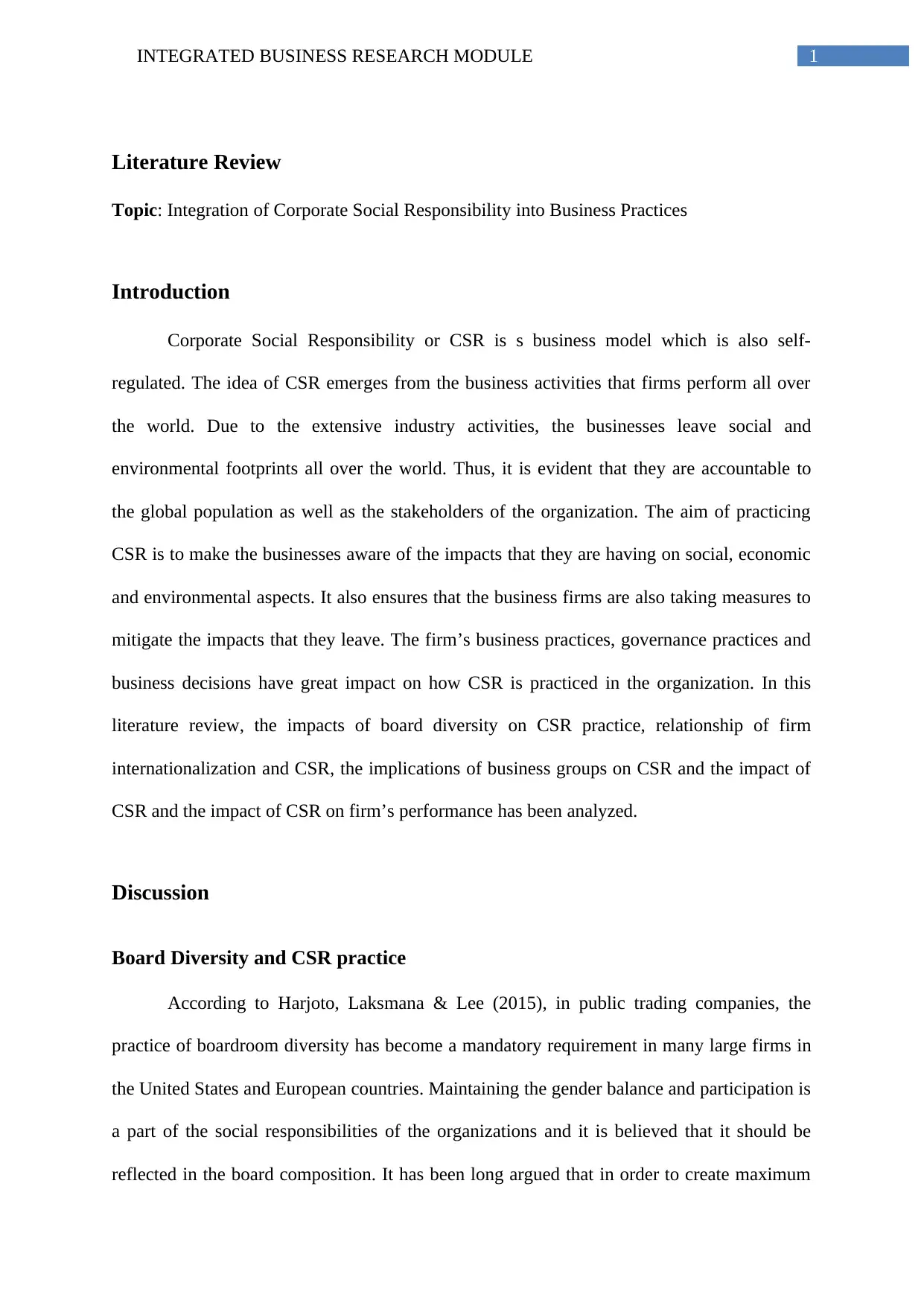
1INTEGRATED BUSINESS RESEARCH MODULE
Literature Review
Topic: Integration of Corporate Social Responsibility into Business Practices
Introduction
Corporate Social Responsibility or CSR is s business model which is also self-
regulated. The idea of CSR emerges from the business activities that firms perform all over
the world. Due to the extensive industry activities, the businesses leave social and
environmental footprints all over the world. Thus, it is evident that they are accountable to
the global population as well as the stakeholders of the organization. The aim of practicing
CSR is to make the businesses aware of the impacts that they are having on social, economic
and environmental aspects. It also ensures that the business firms are also taking measures to
mitigate the impacts that they leave. The firm’s business practices, governance practices and
business decisions have great impact on how CSR is practiced in the organization. In this
literature review, the impacts of board diversity on CSR practice, relationship of firm
internationalization and CSR, the implications of business groups on CSR and the impact of
CSR and the impact of CSR on firm’s performance has been analyzed.
Discussion
Board Diversity and CSR practice
According to Harjoto, Laksmana & Lee (2015), in public trading companies, the
practice of boardroom diversity has become a mandatory requirement in many large firms in
the United States and European countries. Maintaining the gender balance and participation is
a part of the social responsibilities of the organizations and it is believed that it should be
reflected in the board composition. It has been long argued that in order to create maximum
Literature Review
Topic: Integration of Corporate Social Responsibility into Business Practices
Introduction
Corporate Social Responsibility or CSR is s business model which is also self-
regulated. The idea of CSR emerges from the business activities that firms perform all over
the world. Due to the extensive industry activities, the businesses leave social and
environmental footprints all over the world. Thus, it is evident that they are accountable to
the global population as well as the stakeholders of the organization. The aim of practicing
CSR is to make the businesses aware of the impacts that they are having on social, economic
and environmental aspects. It also ensures that the business firms are also taking measures to
mitigate the impacts that they leave. The firm’s business practices, governance practices and
business decisions have great impact on how CSR is practiced in the organization. In this
literature review, the impacts of board diversity on CSR practice, relationship of firm
internationalization and CSR, the implications of business groups on CSR and the impact of
CSR and the impact of CSR on firm’s performance has been analyzed.
Discussion
Board Diversity and CSR practice
According to Harjoto, Laksmana & Lee (2015), in public trading companies, the
practice of boardroom diversity has become a mandatory requirement in many large firms in
the United States and European countries. Maintaining the gender balance and participation is
a part of the social responsibilities of the organizations and it is believed that it should be
reflected in the board composition. It has been long argued that in order to create maximum
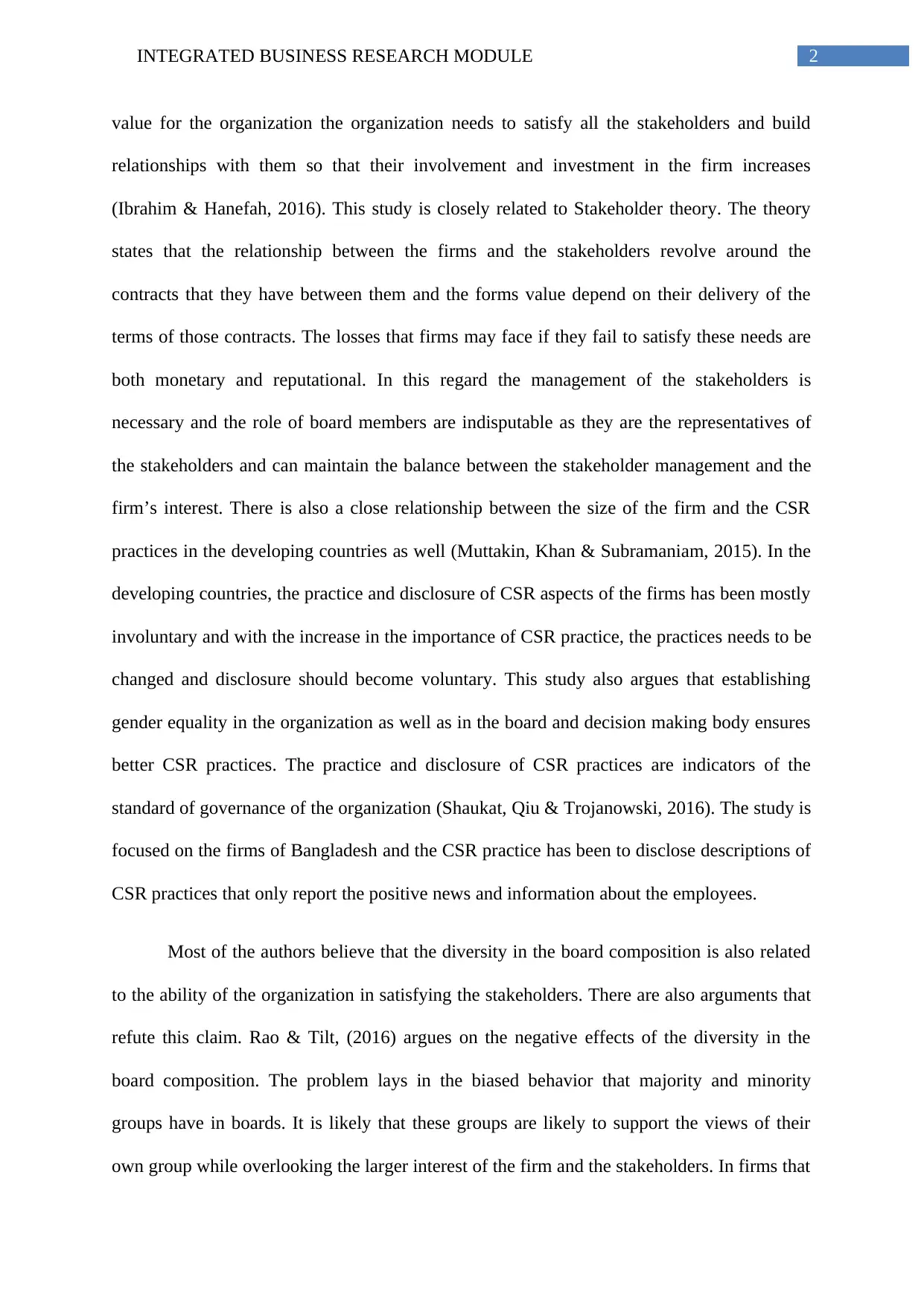
2INTEGRATED BUSINESS RESEARCH MODULE
value for the organization the organization needs to satisfy all the stakeholders and build
relationships with them so that their involvement and investment in the firm increases
(Ibrahim & Hanefah, 2016). This study is closely related to Stakeholder theory. The theory
states that the relationship between the firms and the stakeholders revolve around the
contracts that they have between them and the forms value depend on their delivery of the
terms of those contracts. The losses that firms may face if they fail to satisfy these needs are
both monetary and reputational. In this regard the management of the stakeholders is
necessary and the role of board members are indisputable as they are the representatives of
the stakeholders and can maintain the balance between the stakeholder management and the
firm’s interest. There is also a close relationship between the size of the firm and the CSR
practices in the developing countries as well (Muttakin, Khan & Subramaniam, 2015). In the
developing countries, the practice and disclosure of CSR aspects of the firms has been mostly
involuntary and with the increase in the importance of CSR practice, the practices needs to be
changed and disclosure should become voluntary. This study also argues that establishing
gender equality in the organization as well as in the board and decision making body ensures
better CSR practices. The practice and disclosure of CSR practices are indicators of the
standard of governance of the organization (Shaukat, Qiu & Trojanowski, 2016). The study is
focused on the firms of Bangladesh and the CSR practice has been to disclose descriptions of
CSR practices that only report the positive news and information about the employees.
Most of the authors believe that the diversity in the board composition is also related
to the ability of the organization in satisfying the stakeholders. There are also arguments that
refute this claim. Rao & Tilt, (2016) argues on the negative effects of the diversity in the
board composition. The problem lays in the biased behavior that majority and minority
groups have in boards. It is likely that these groups are likely to support the views of their
own group while overlooking the larger interest of the firm and the stakeholders. In firms that
value for the organization the organization needs to satisfy all the stakeholders and build
relationships with them so that their involvement and investment in the firm increases
(Ibrahim & Hanefah, 2016). This study is closely related to Stakeholder theory. The theory
states that the relationship between the firms and the stakeholders revolve around the
contracts that they have between them and the forms value depend on their delivery of the
terms of those contracts. The losses that firms may face if they fail to satisfy these needs are
both monetary and reputational. In this regard the management of the stakeholders is
necessary and the role of board members are indisputable as they are the representatives of
the stakeholders and can maintain the balance between the stakeholder management and the
firm’s interest. There is also a close relationship between the size of the firm and the CSR
practices in the developing countries as well (Muttakin, Khan & Subramaniam, 2015). In the
developing countries, the practice and disclosure of CSR aspects of the firms has been mostly
involuntary and with the increase in the importance of CSR practice, the practices needs to be
changed and disclosure should become voluntary. This study also argues that establishing
gender equality in the organization as well as in the board and decision making body ensures
better CSR practices. The practice and disclosure of CSR practices are indicators of the
standard of governance of the organization (Shaukat, Qiu & Trojanowski, 2016). The study is
focused on the firms of Bangladesh and the CSR practice has been to disclose descriptions of
CSR practices that only report the positive news and information about the employees.
Most of the authors believe that the diversity in the board composition is also related
to the ability of the organization in satisfying the stakeholders. There are also arguments that
refute this claim. Rao & Tilt, (2016) argues on the negative effects of the diversity in the
board composition. The problem lays in the biased behavior that majority and minority
groups have in boards. It is likely that these groups are likely to support the views of their
own group while overlooking the larger interest of the firm and the stakeholders. In firms that
⊘ This is a preview!⊘
Do you want full access?
Subscribe today to unlock all pages.

Trusted by 1+ million students worldwide
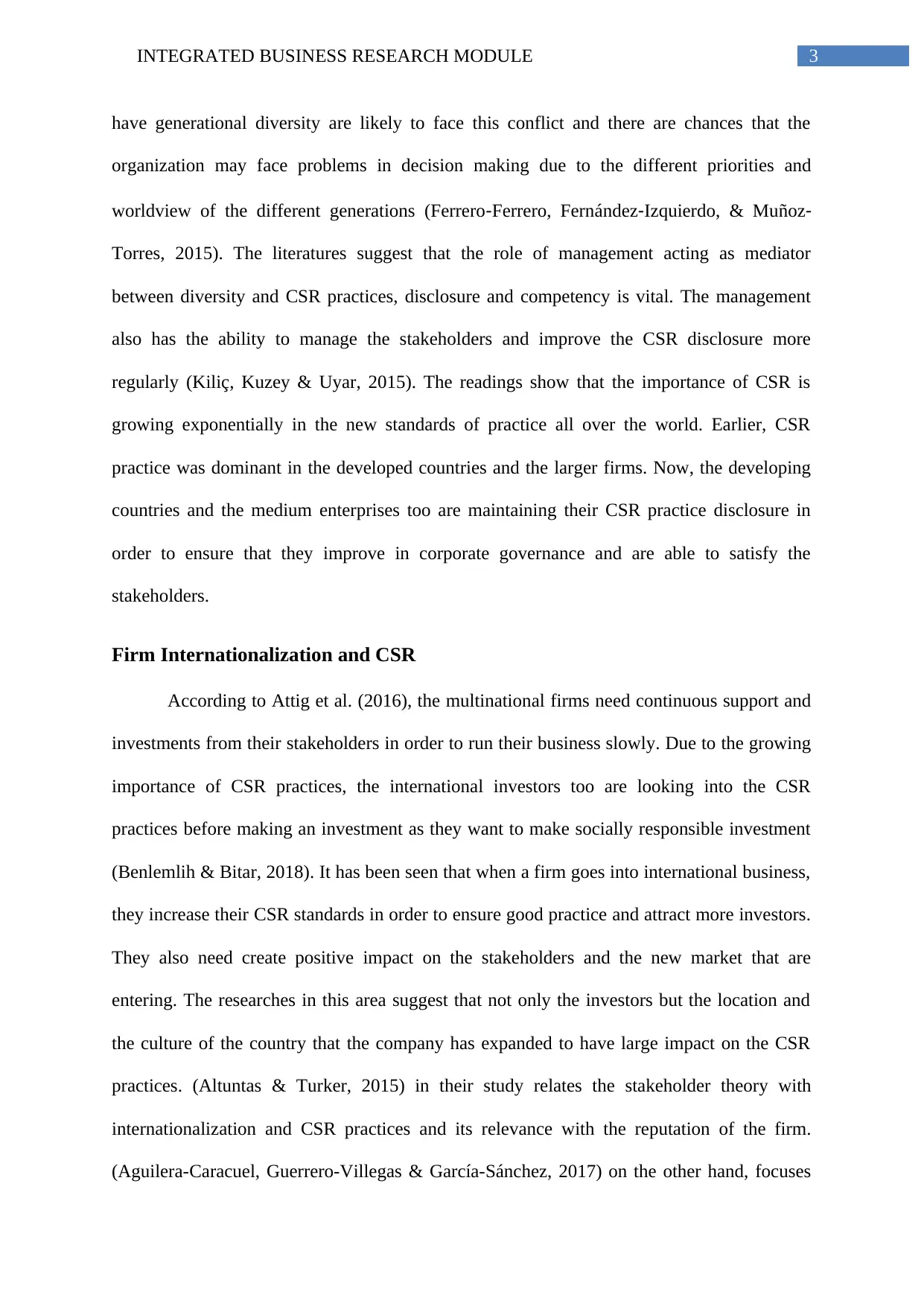
3INTEGRATED BUSINESS RESEARCH MODULE
have generational diversity are likely to face this conflict and there are chances that the
organization may face problems in decision making due to the different priorities and
worldview of the different generations (Ferrero‐Ferrero, Fernández‐Izquierdo, & Muñoz‐
Torres, 2015). The literatures suggest that the role of management acting as mediator
between diversity and CSR practices, disclosure and competency is vital. The management
also has the ability to manage the stakeholders and improve the CSR disclosure more
regularly (Kiliç, Kuzey & Uyar, 2015). The readings show that the importance of CSR is
growing exponentially in the new standards of practice all over the world. Earlier, CSR
practice was dominant in the developed countries and the larger firms. Now, the developing
countries and the medium enterprises too are maintaining their CSR practice disclosure in
order to ensure that they improve in corporate governance and are able to satisfy the
stakeholders.
Firm Internationalization and CSR
According to Attig et al. (2016), the multinational firms need continuous support and
investments from their stakeholders in order to run their business slowly. Due to the growing
importance of CSR practices, the international investors too are looking into the CSR
practices before making an investment as they want to make socially responsible investment
(Benlemlih & Bitar, 2018). It has been seen that when a firm goes into international business,
they increase their CSR standards in order to ensure good practice and attract more investors.
They also need create positive impact on the stakeholders and the new market that are
entering. The researches in this area suggest that not only the investors but the location and
the culture of the country that the company has expanded to have large impact on the CSR
practices. (Altuntas & Turker, 2015) in their study relates the stakeholder theory with
internationalization and CSR practices and its relevance with the reputation of the firm.
(Aguilera-Caracuel, Guerrero-Villegas & García-Sánchez, 2017) on the other hand, focuses
have generational diversity are likely to face this conflict and there are chances that the
organization may face problems in decision making due to the different priorities and
worldview of the different generations (Ferrero‐Ferrero, Fernández‐Izquierdo, & Muñoz‐
Torres, 2015). The literatures suggest that the role of management acting as mediator
between diversity and CSR practices, disclosure and competency is vital. The management
also has the ability to manage the stakeholders and improve the CSR disclosure more
regularly (Kiliç, Kuzey & Uyar, 2015). The readings show that the importance of CSR is
growing exponentially in the new standards of practice all over the world. Earlier, CSR
practice was dominant in the developed countries and the larger firms. Now, the developing
countries and the medium enterprises too are maintaining their CSR practice disclosure in
order to ensure that they improve in corporate governance and are able to satisfy the
stakeholders.
Firm Internationalization and CSR
According to Attig et al. (2016), the multinational firms need continuous support and
investments from their stakeholders in order to run their business slowly. Due to the growing
importance of CSR practices, the international investors too are looking into the CSR
practices before making an investment as they want to make socially responsible investment
(Benlemlih & Bitar, 2018). It has been seen that when a firm goes into international business,
they increase their CSR standards in order to ensure good practice and attract more investors.
They also need create positive impact on the stakeholders and the new market that are
entering. The researches in this area suggest that not only the investors but the location and
the culture of the country that the company has expanded to have large impact on the CSR
practices. (Altuntas & Turker, 2015) in their study relates the stakeholder theory with
internationalization and CSR practices and its relevance with the reputation of the firm.
(Aguilera-Caracuel, Guerrero-Villegas & García-Sánchez, 2017) on the other hand, focuses
Paraphrase This Document
Need a fresh take? Get an instant paraphrase of this document with our AI Paraphraser
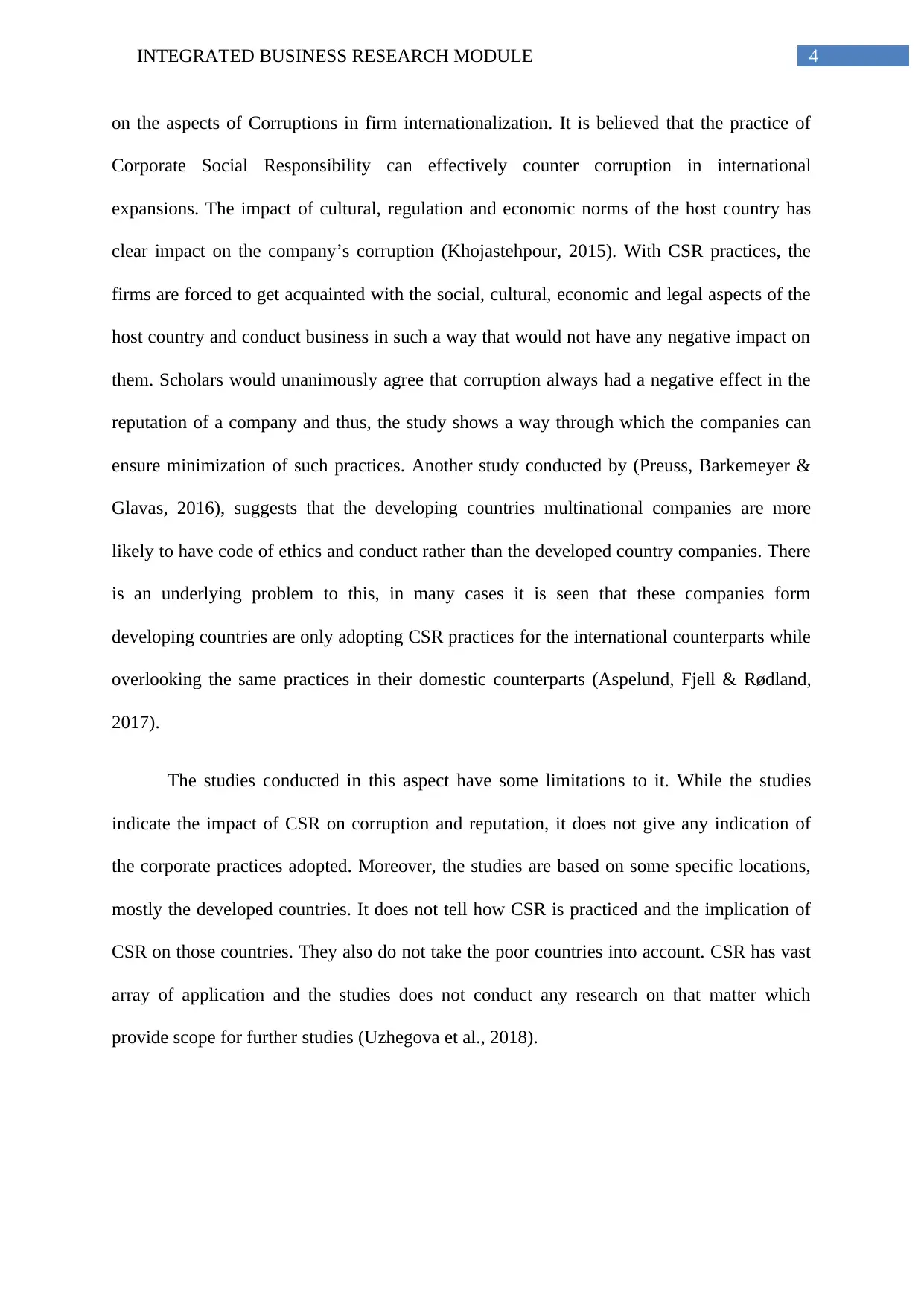
4INTEGRATED BUSINESS RESEARCH MODULE
on the aspects of Corruptions in firm internationalization. It is believed that the practice of
Corporate Social Responsibility can effectively counter corruption in international
expansions. The impact of cultural, regulation and economic norms of the host country has
clear impact on the company’s corruption (Khojastehpour, 2015). With CSR practices, the
firms are forced to get acquainted with the social, cultural, economic and legal aspects of the
host country and conduct business in such a way that would not have any negative impact on
them. Scholars would unanimously agree that corruption always had a negative effect in the
reputation of a company and thus, the study shows a way through which the companies can
ensure minimization of such practices. Another study conducted by (Preuss, Barkemeyer &
Glavas, 2016), suggests that the developing countries multinational companies are more
likely to have code of ethics and conduct rather than the developed country companies. There
is an underlying problem to this, in many cases it is seen that these companies form
developing countries are only adopting CSR practices for the international counterparts while
overlooking the same practices in their domestic counterparts (Aspelund, Fjell & Rødland,
2017).
The studies conducted in this aspect have some limitations to it. While the studies
indicate the impact of CSR on corruption and reputation, it does not give any indication of
the corporate practices adopted. Moreover, the studies are based on some specific locations,
mostly the developed countries. It does not tell how CSR is practiced and the implication of
CSR on those countries. They also do not take the poor countries into account. CSR has vast
array of application and the studies does not conduct any research on that matter which
provide scope for further studies (Uzhegova et al., 2018).
on the aspects of Corruptions in firm internationalization. It is believed that the practice of
Corporate Social Responsibility can effectively counter corruption in international
expansions. The impact of cultural, regulation and economic norms of the host country has
clear impact on the company’s corruption (Khojastehpour, 2015). With CSR practices, the
firms are forced to get acquainted with the social, cultural, economic and legal aspects of the
host country and conduct business in such a way that would not have any negative impact on
them. Scholars would unanimously agree that corruption always had a negative effect in the
reputation of a company and thus, the study shows a way through which the companies can
ensure minimization of such practices. Another study conducted by (Preuss, Barkemeyer &
Glavas, 2016), suggests that the developing countries multinational companies are more
likely to have code of ethics and conduct rather than the developed country companies. There
is an underlying problem to this, in many cases it is seen that these companies form
developing countries are only adopting CSR practices for the international counterparts while
overlooking the same practices in their domestic counterparts (Aspelund, Fjell & Rødland,
2017).
The studies conducted in this aspect have some limitations to it. While the studies
indicate the impact of CSR on corruption and reputation, it does not give any indication of
the corporate practices adopted. Moreover, the studies are based on some specific locations,
mostly the developed countries. It does not tell how CSR is practiced and the implication of
CSR on those countries. They also do not take the poor countries into account. CSR has vast
array of application and the studies does not conduct any research on that matter which
provide scope for further studies (Uzhegova et al., 2018).
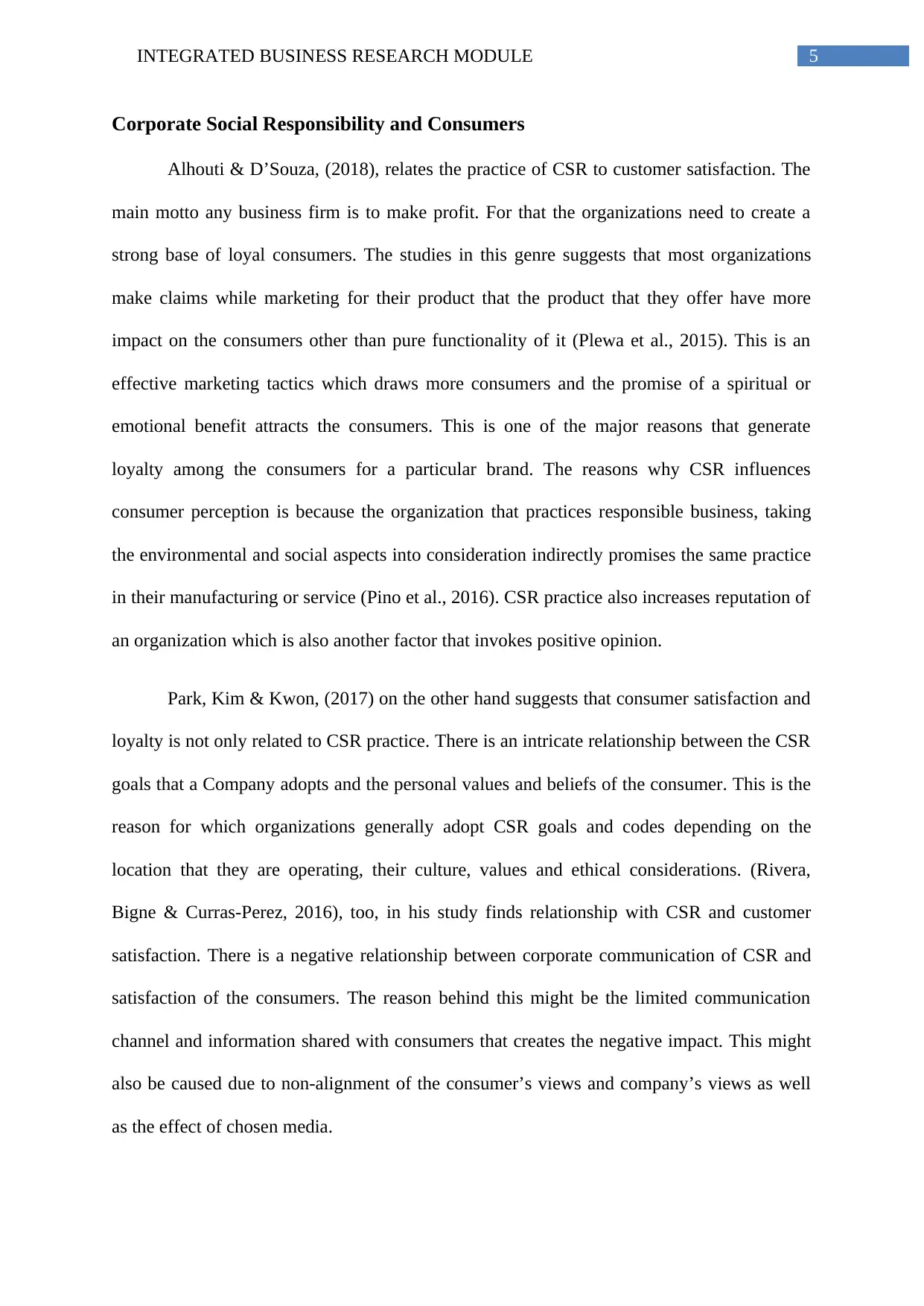
5INTEGRATED BUSINESS RESEARCH MODULE
Corporate Social Responsibility and Consumers
Alhouti & D’Souza, (2018), relates the practice of CSR to customer satisfaction. The
main motto any business firm is to make profit. For that the organizations need to create a
strong base of loyal consumers. The studies in this genre suggests that most organizations
make claims while marketing for their product that the product that they offer have more
impact on the consumers other than pure functionality of it (Plewa et al., 2015). This is an
effective marketing tactics which draws more consumers and the promise of a spiritual or
emotional benefit attracts the consumers. This is one of the major reasons that generate
loyalty among the consumers for a particular brand. The reasons why CSR influences
consumer perception is because the organization that practices responsible business, taking
the environmental and social aspects into consideration indirectly promises the same practice
in their manufacturing or service (Pino et al., 2016). CSR practice also increases reputation of
an organization which is also another factor that invokes positive opinion.
Park, Kim & Kwon, (2017) on the other hand suggests that consumer satisfaction and
loyalty is not only related to CSR practice. There is an intricate relationship between the CSR
goals that a Company adopts and the personal values and beliefs of the consumer. This is the
reason for which organizations generally adopt CSR goals and codes depending on the
location that they are operating, their culture, values and ethical considerations. (Rivera,
Bigne & Curras-Perez, 2016), too, in his study finds relationship with CSR and customer
satisfaction. There is a negative relationship between corporate communication of CSR and
satisfaction of the consumers. The reason behind this might be the limited communication
channel and information shared with consumers that creates the negative impact. This might
also be caused due to non-alignment of the consumer’s views and company’s views as well
as the effect of chosen media.
Corporate Social Responsibility and Consumers
Alhouti & D’Souza, (2018), relates the practice of CSR to customer satisfaction. The
main motto any business firm is to make profit. For that the organizations need to create a
strong base of loyal consumers. The studies in this genre suggests that most organizations
make claims while marketing for their product that the product that they offer have more
impact on the consumers other than pure functionality of it (Plewa et al., 2015). This is an
effective marketing tactics which draws more consumers and the promise of a spiritual or
emotional benefit attracts the consumers. This is one of the major reasons that generate
loyalty among the consumers for a particular brand. The reasons why CSR influences
consumer perception is because the organization that practices responsible business, taking
the environmental and social aspects into consideration indirectly promises the same practice
in their manufacturing or service (Pino et al., 2016). CSR practice also increases reputation of
an organization which is also another factor that invokes positive opinion.
Park, Kim & Kwon, (2017) on the other hand suggests that consumer satisfaction and
loyalty is not only related to CSR practice. There is an intricate relationship between the CSR
goals that a Company adopts and the personal values and beliefs of the consumer. This is the
reason for which organizations generally adopt CSR goals and codes depending on the
location that they are operating, their culture, values and ethical considerations. (Rivera,
Bigne & Curras-Perez, 2016), too, in his study finds relationship with CSR and customer
satisfaction. There is a negative relationship between corporate communication of CSR and
satisfaction of the consumers. The reason behind this might be the limited communication
channel and information shared with consumers that creates the negative impact. This might
also be caused due to non-alignment of the consumer’s views and company’s views as well
as the effect of chosen media.
⊘ This is a preview!⊘
Do you want full access?
Subscribe today to unlock all pages.

Trusted by 1+ million students worldwide
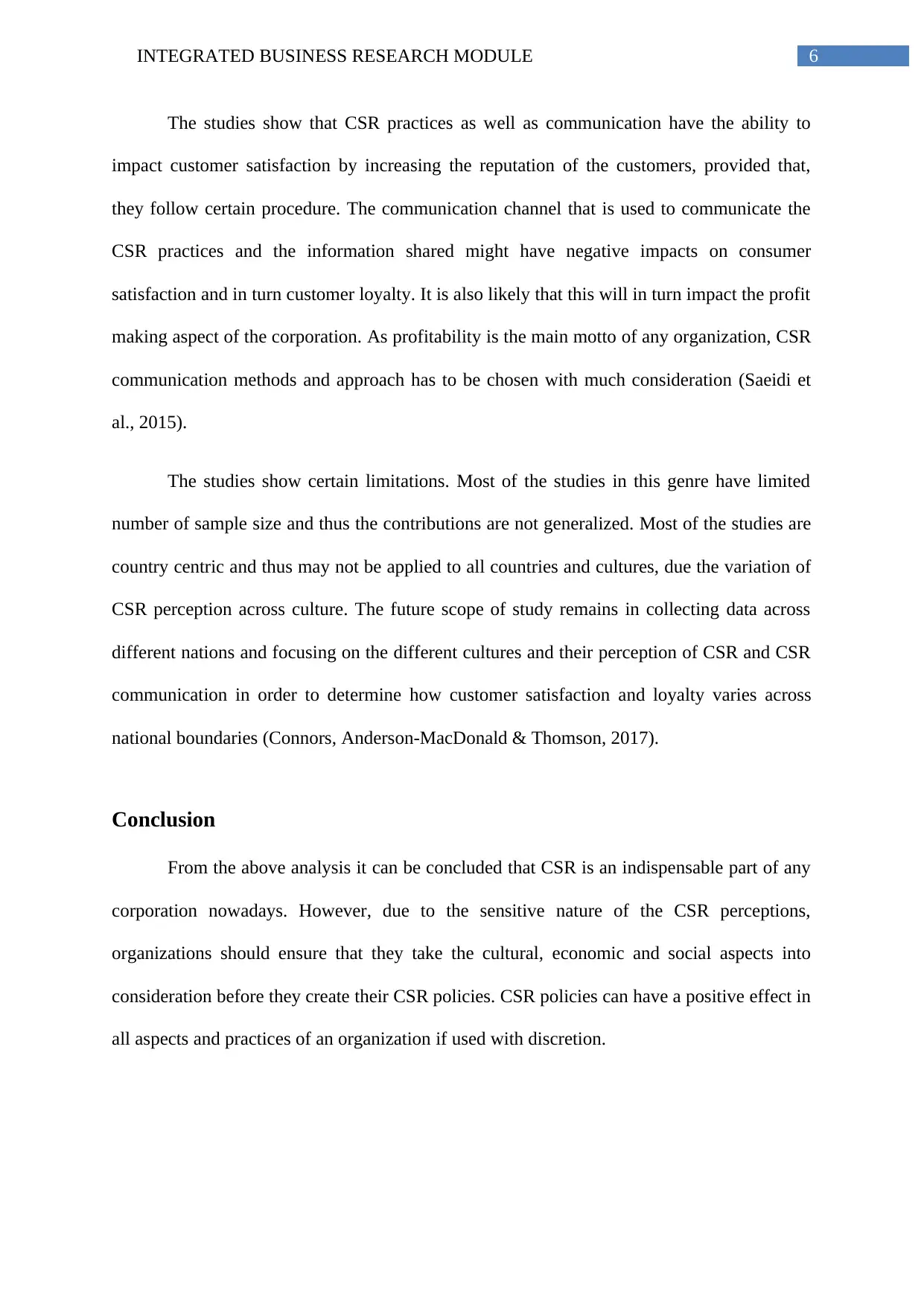
6INTEGRATED BUSINESS RESEARCH MODULE
The studies show that CSR practices as well as communication have the ability to
impact customer satisfaction by increasing the reputation of the customers, provided that,
they follow certain procedure. The communication channel that is used to communicate the
CSR practices and the information shared might have negative impacts on consumer
satisfaction and in turn customer loyalty. It is also likely that this will in turn impact the profit
making aspect of the corporation. As profitability is the main motto of any organization, CSR
communication methods and approach has to be chosen with much consideration (Saeidi et
al., 2015).
The studies show certain limitations. Most of the studies in this genre have limited
number of sample size and thus the contributions are not generalized. Most of the studies are
country centric and thus may not be applied to all countries and cultures, due the variation of
CSR perception across culture. The future scope of study remains in collecting data across
different nations and focusing on the different cultures and their perception of CSR and CSR
communication in order to determine how customer satisfaction and loyalty varies across
national boundaries (Connors, Anderson-MacDonald & Thomson, 2017).
Conclusion
From the above analysis it can be concluded that CSR is an indispensable part of any
corporation nowadays. However, due to the sensitive nature of the CSR perceptions,
organizations should ensure that they take the cultural, economic and social aspects into
consideration before they create their CSR policies. CSR policies can have a positive effect in
all aspects and practices of an organization if used with discretion.
The studies show that CSR practices as well as communication have the ability to
impact customer satisfaction by increasing the reputation of the customers, provided that,
they follow certain procedure. The communication channel that is used to communicate the
CSR practices and the information shared might have negative impacts on consumer
satisfaction and in turn customer loyalty. It is also likely that this will in turn impact the profit
making aspect of the corporation. As profitability is the main motto of any organization, CSR
communication methods and approach has to be chosen with much consideration (Saeidi et
al., 2015).
The studies show certain limitations. Most of the studies in this genre have limited
number of sample size and thus the contributions are not generalized. Most of the studies are
country centric and thus may not be applied to all countries and cultures, due the variation of
CSR perception across culture. The future scope of study remains in collecting data across
different nations and focusing on the different cultures and their perception of CSR and CSR
communication in order to determine how customer satisfaction and loyalty varies across
national boundaries (Connors, Anderson-MacDonald & Thomson, 2017).
Conclusion
From the above analysis it can be concluded that CSR is an indispensable part of any
corporation nowadays. However, due to the sensitive nature of the CSR perceptions,
organizations should ensure that they take the cultural, economic and social aspects into
consideration before they create their CSR policies. CSR policies can have a positive effect in
all aspects and practices of an organization if used with discretion.
Paraphrase This Document
Need a fresh take? Get an instant paraphrase of this document with our AI Paraphraser
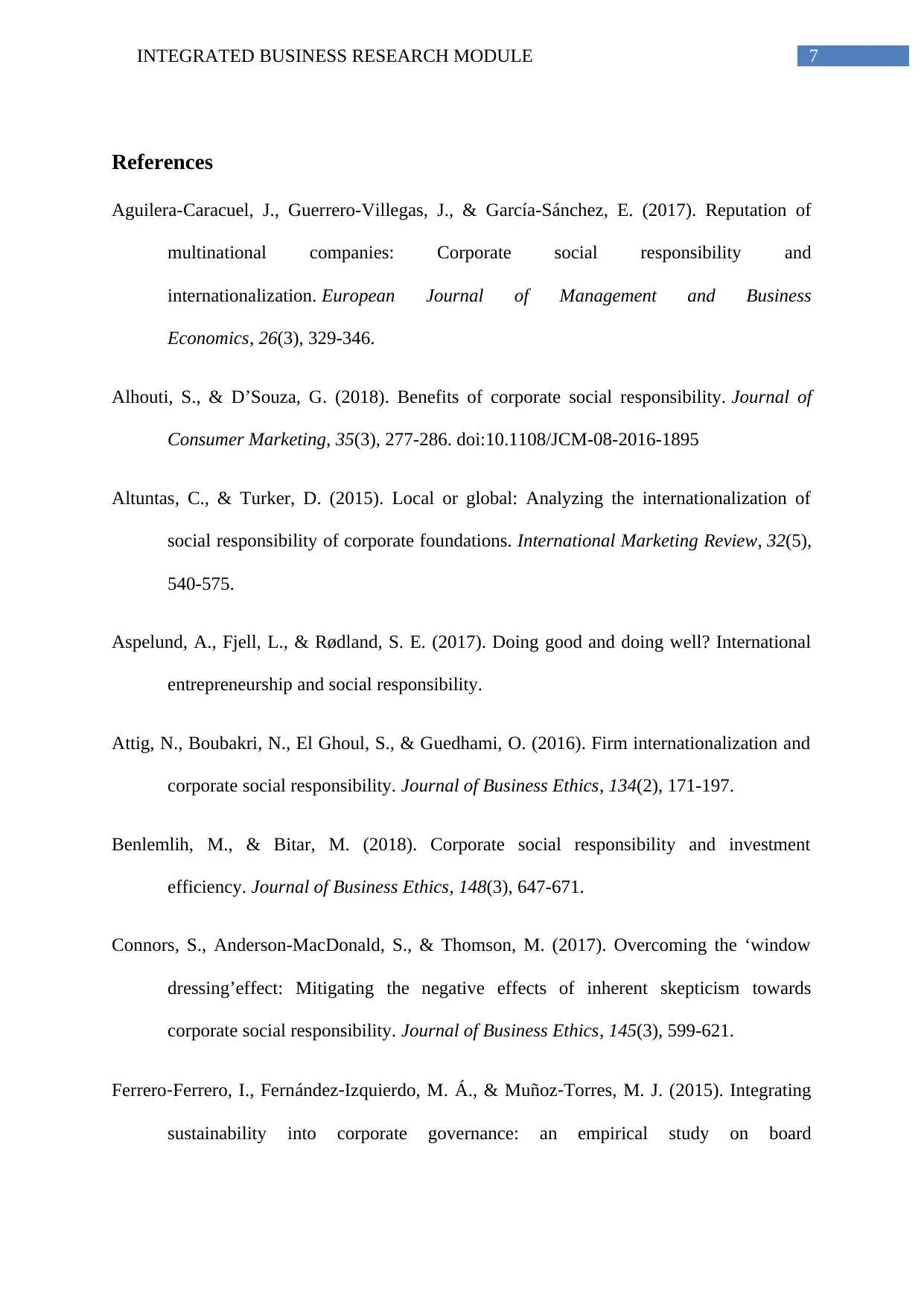
7INTEGRATED BUSINESS RESEARCH MODULE
References
Aguilera-Caracuel, J., Guerrero-Villegas, J., & García-Sánchez, E. (2017). Reputation of
multinational companies: Corporate social responsibility and
internationalization. European Journal of Management and Business
Economics, 26(3), 329-346.
Alhouti, S., & D’Souza, G. (2018). Benefits of corporate social responsibility. Journal of
Consumer Marketing, 35(3), 277-286. doi:10.1108/JCM-08-2016-1895
Altuntas, C., & Turker, D. (2015). Local or global: Analyzing the internationalization of
social responsibility of corporate foundations. International Marketing Review, 32(5),
540-575.
Aspelund, A., Fjell, L., & Rødland, S. E. (2017). Doing good and doing well? International
entrepreneurship and social responsibility.
Attig, N., Boubakri, N., El Ghoul, S., & Guedhami, O. (2016). Firm internationalization and
corporate social responsibility. Journal of Business Ethics, 134(2), 171-197.
Benlemlih, M., & Bitar, M. (2018). Corporate social responsibility and investment
efficiency. Journal of Business Ethics, 148(3), 647-671.
Connors, S., Anderson-MacDonald, S., & Thomson, M. (2017). Overcoming the ‘window
dressing’effect: Mitigating the negative effects of inherent skepticism towards
corporate social responsibility. Journal of Business Ethics, 145(3), 599-621.
Ferrero‐Ferrero, I., Fernández‐Izquierdo, M. Á., & Muñoz‐Torres, M. J. (2015). Integrating
sustainability into corporate governance: an empirical study on board
References
Aguilera-Caracuel, J., Guerrero-Villegas, J., & García-Sánchez, E. (2017). Reputation of
multinational companies: Corporate social responsibility and
internationalization. European Journal of Management and Business
Economics, 26(3), 329-346.
Alhouti, S., & D’Souza, G. (2018). Benefits of corporate social responsibility. Journal of
Consumer Marketing, 35(3), 277-286. doi:10.1108/JCM-08-2016-1895
Altuntas, C., & Turker, D. (2015). Local or global: Analyzing the internationalization of
social responsibility of corporate foundations. International Marketing Review, 32(5),
540-575.
Aspelund, A., Fjell, L., & Rødland, S. E. (2017). Doing good and doing well? International
entrepreneurship and social responsibility.
Attig, N., Boubakri, N., El Ghoul, S., & Guedhami, O. (2016). Firm internationalization and
corporate social responsibility. Journal of Business Ethics, 134(2), 171-197.
Benlemlih, M., & Bitar, M. (2018). Corporate social responsibility and investment
efficiency. Journal of Business Ethics, 148(3), 647-671.
Connors, S., Anderson-MacDonald, S., & Thomson, M. (2017). Overcoming the ‘window
dressing’effect: Mitigating the negative effects of inherent skepticism towards
corporate social responsibility. Journal of Business Ethics, 145(3), 599-621.
Ferrero‐Ferrero, I., Fernández‐Izquierdo, M. Á., & Muñoz‐Torres, M. J. (2015). Integrating
sustainability into corporate governance: an empirical study on board
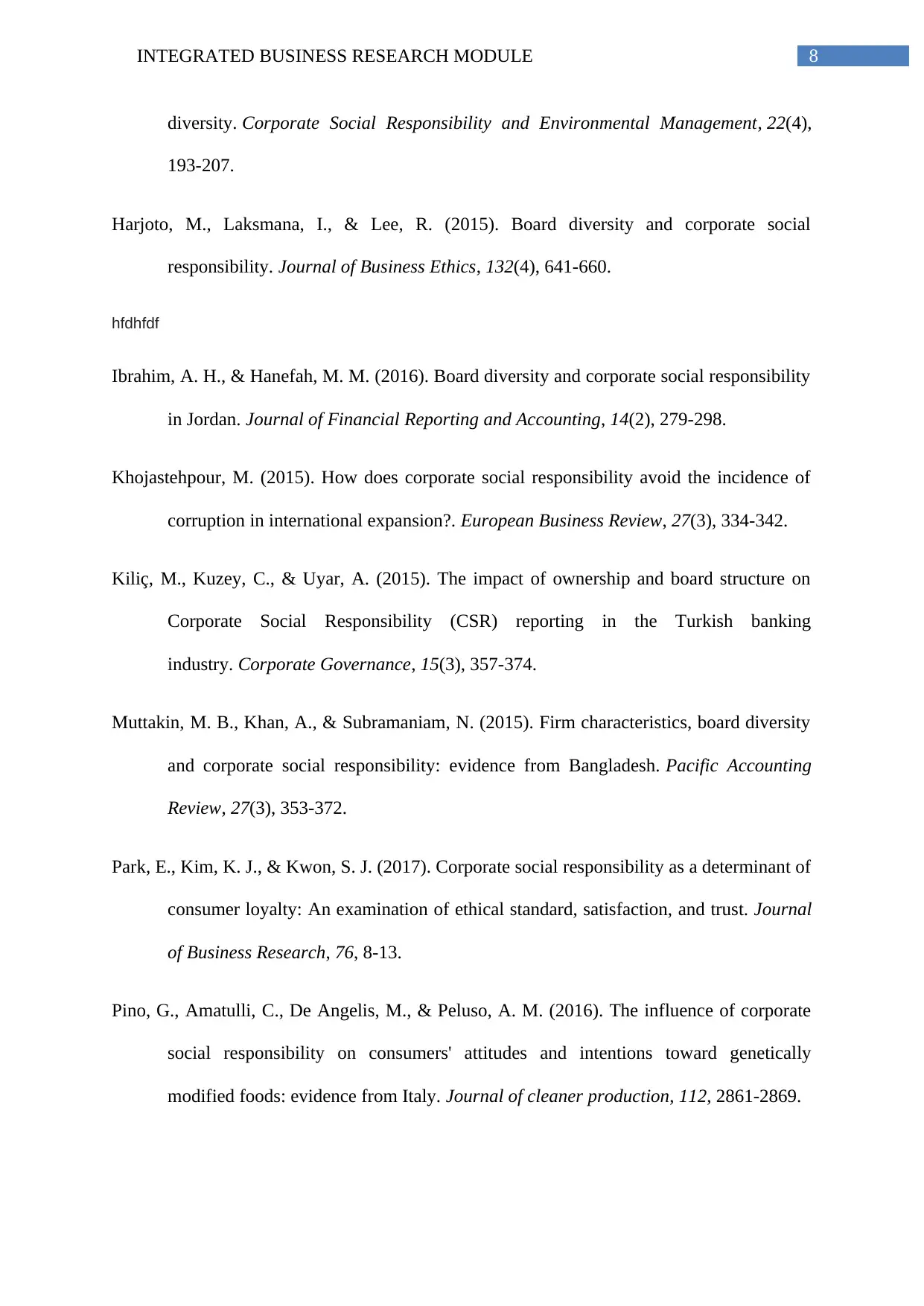
8INTEGRATED BUSINESS RESEARCH MODULE
diversity. Corporate Social Responsibility and Environmental Management, 22(4),
193-207.
Harjoto, M., Laksmana, I., & Lee, R. (2015). Board diversity and corporate social
responsibility. Journal of Business Ethics, 132(4), 641-660.
hfdhfdf
Ibrahim, A. H., & Hanefah, M. M. (2016). Board diversity and corporate social responsibility
in Jordan. Journal of Financial Reporting and Accounting, 14(2), 279-298.
Khojastehpour, M. (2015). How does corporate social responsibility avoid the incidence of
corruption in international expansion?. European Business Review, 27(3), 334-342.
Kiliç, M., Kuzey, C., & Uyar, A. (2015). The impact of ownership and board structure on
Corporate Social Responsibility (CSR) reporting in the Turkish banking
industry. Corporate Governance, 15(3), 357-374.
Muttakin, M. B., Khan, A., & Subramaniam, N. (2015). Firm characteristics, board diversity
and corporate social responsibility: evidence from Bangladesh. Pacific Accounting
Review, 27(3), 353-372.
Park, E., Kim, K. J., & Kwon, S. J. (2017). Corporate social responsibility as a determinant of
consumer loyalty: An examination of ethical standard, satisfaction, and trust. Journal
of Business Research, 76, 8-13.
Pino, G., Amatulli, C., De Angelis, M., & Peluso, A. M. (2016). The influence of corporate
social responsibility on consumers' attitudes and intentions toward genetically
modified foods: evidence from Italy. Journal of cleaner production, 112, 2861-2869.
diversity. Corporate Social Responsibility and Environmental Management, 22(4),
193-207.
Harjoto, M., Laksmana, I., & Lee, R. (2015). Board diversity and corporate social
responsibility. Journal of Business Ethics, 132(4), 641-660.
hfdhfdf
Ibrahim, A. H., & Hanefah, M. M. (2016). Board diversity and corporate social responsibility
in Jordan. Journal of Financial Reporting and Accounting, 14(2), 279-298.
Khojastehpour, M. (2015). How does corporate social responsibility avoid the incidence of
corruption in international expansion?. European Business Review, 27(3), 334-342.
Kiliç, M., Kuzey, C., & Uyar, A. (2015). The impact of ownership and board structure on
Corporate Social Responsibility (CSR) reporting in the Turkish banking
industry. Corporate Governance, 15(3), 357-374.
Muttakin, M. B., Khan, A., & Subramaniam, N. (2015). Firm characteristics, board diversity
and corporate social responsibility: evidence from Bangladesh. Pacific Accounting
Review, 27(3), 353-372.
Park, E., Kim, K. J., & Kwon, S. J. (2017). Corporate social responsibility as a determinant of
consumer loyalty: An examination of ethical standard, satisfaction, and trust. Journal
of Business Research, 76, 8-13.
Pino, G., Amatulli, C., De Angelis, M., & Peluso, A. M. (2016). The influence of corporate
social responsibility on consumers' attitudes and intentions toward genetically
modified foods: evidence from Italy. Journal of cleaner production, 112, 2861-2869.
⊘ This is a preview!⊘
Do you want full access?
Subscribe today to unlock all pages.

Trusted by 1+ million students worldwide
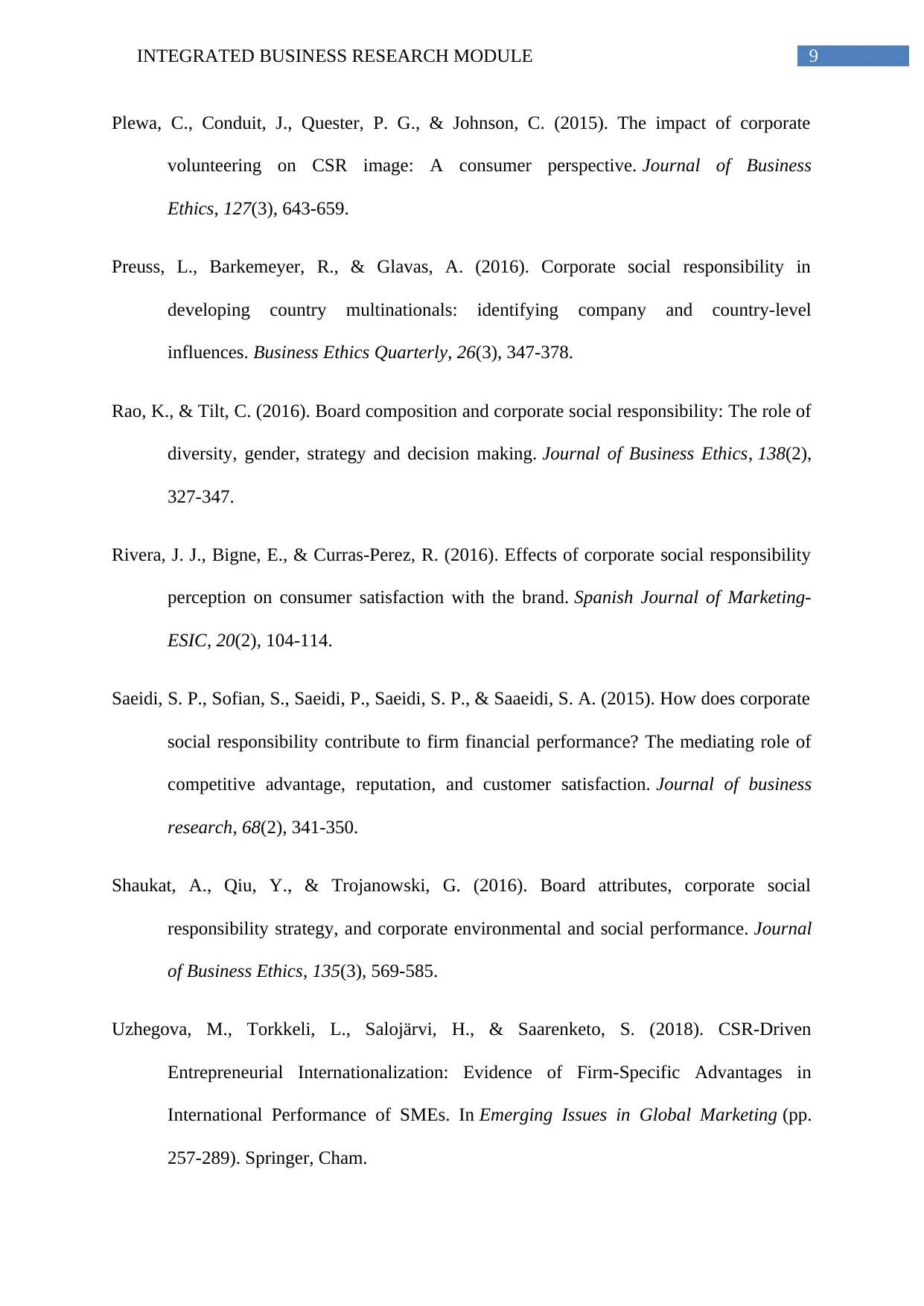
9INTEGRATED BUSINESS RESEARCH MODULE
Plewa, C., Conduit, J., Quester, P. G., & Johnson, C. (2015). The impact of corporate
volunteering on CSR image: A consumer perspective. Journal of Business
Ethics, 127(3), 643-659.
Preuss, L., Barkemeyer, R., & Glavas, A. (2016). Corporate social responsibility in
developing country multinationals: identifying company and country-level
influences. Business Ethics Quarterly, 26(3), 347-378.
Rao, K., & Tilt, C. (2016). Board composition and corporate social responsibility: The role of
diversity, gender, strategy and decision making. Journal of Business Ethics, 138(2),
327-347.
Rivera, J. J., Bigne, E., & Curras-Perez, R. (2016). Effects of corporate social responsibility
perception on consumer satisfaction with the brand. Spanish Journal of Marketing-
ESIC, 20(2), 104-114.
Saeidi, S. P., Sofian, S., Saeidi, P., Saeidi, S. P., & Saaeidi, S. A. (2015). How does corporate
social responsibility contribute to firm financial performance? The mediating role of
competitive advantage, reputation, and customer satisfaction. Journal of business
research, 68(2), 341-350.
Shaukat, A., Qiu, Y., & Trojanowski, G. (2016). Board attributes, corporate social
responsibility strategy, and corporate environmental and social performance. Journal
of Business Ethics, 135(3), 569-585.
Uzhegova, M., Torkkeli, L., Salojärvi, H., & Saarenketo, S. (2018). CSR-Driven
Entrepreneurial Internationalization: Evidence of Firm-Specific Advantages in
International Performance of SMEs. In Emerging Issues in Global Marketing (pp.
257-289). Springer, Cham.
Plewa, C., Conduit, J., Quester, P. G., & Johnson, C. (2015). The impact of corporate
volunteering on CSR image: A consumer perspective. Journal of Business
Ethics, 127(3), 643-659.
Preuss, L., Barkemeyer, R., & Glavas, A. (2016). Corporate social responsibility in
developing country multinationals: identifying company and country-level
influences. Business Ethics Quarterly, 26(3), 347-378.
Rao, K., & Tilt, C. (2016). Board composition and corporate social responsibility: The role of
diversity, gender, strategy and decision making. Journal of Business Ethics, 138(2),
327-347.
Rivera, J. J., Bigne, E., & Curras-Perez, R. (2016). Effects of corporate social responsibility
perception on consumer satisfaction with the brand. Spanish Journal of Marketing-
ESIC, 20(2), 104-114.
Saeidi, S. P., Sofian, S., Saeidi, P., Saeidi, S. P., & Saaeidi, S. A. (2015). How does corporate
social responsibility contribute to firm financial performance? The mediating role of
competitive advantage, reputation, and customer satisfaction. Journal of business
research, 68(2), 341-350.
Shaukat, A., Qiu, Y., & Trojanowski, G. (2016). Board attributes, corporate social
responsibility strategy, and corporate environmental and social performance. Journal
of Business Ethics, 135(3), 569-585.
Uzhegova, M., Torkkeli, L., Salojärvi, H., & Saarenketo, S. (2018). CSR-Driven
Entrepreneurial Internationalization: Evidence of Firm-Specific Advantages in
International Performance of SMEs. In Emerging Issues in Global Marketing (pp.
257-289). Springer, Cham.
Paraphrase This Document
Need a fresh take? Get an instant paraphrase of this document with our AI Paraphraser

10INTEGRATED BUSINESS RESEARCH MODULE
1 out of 11
Related Documents
Your All-in-One AI-Powered Toolkit for Academic Success.
+13062052269
info@desklib.com
Available 24*7 on WhatsApp / Email
![[object Object]](/_next/static/media/star-bottom.7253800d.svg)
Unlock your academic potential
Copyright © 2020–2026 A2Z Services. All Rights Reserved. Developed and managed by ZUCOL.





